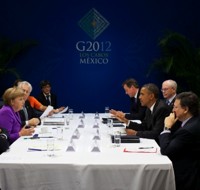The G-20 summit in Los Cabos, Mexico, proved to be far from a diplomatic triumph for U.S. President Barack Obama. Coming on the heels of previous lackluster international gatherings this year -- the Summit of the Americas in Cartagena, the NATO summit in Chicago and the G-8 meeting at Camp David -- it raises the question of whether Washington’s ability to lead in the global system has been compromised. Obama has eschewed attending the Rio+20 “Green Summit” in Rio de Janeiro, a wise choice given that the meeting is also not likely to produce any dramatic breakthroughs.
Some of the lack of progress, most notably reflected in Obama’s rather chilly meeting with Russian President Vladimir Putin, may simply be a result of the electoral calendar, with other governments preferring to wait and see who occupies the White House come January 2013 before making any commitments. But it is also clear that in every major international forum, there are ideological divides that Washington cannot overcome to produce viable policies.
When it comes to drafting United Nations resolutions to put pressure on Syria, for instance, Russia and China are firmly committed to their neo-Westphalian noninterference principles, even if it means allowing the government of President Bashar al-Assad to use excessive force against civilians to crush a domestic rebellion against his rule.

